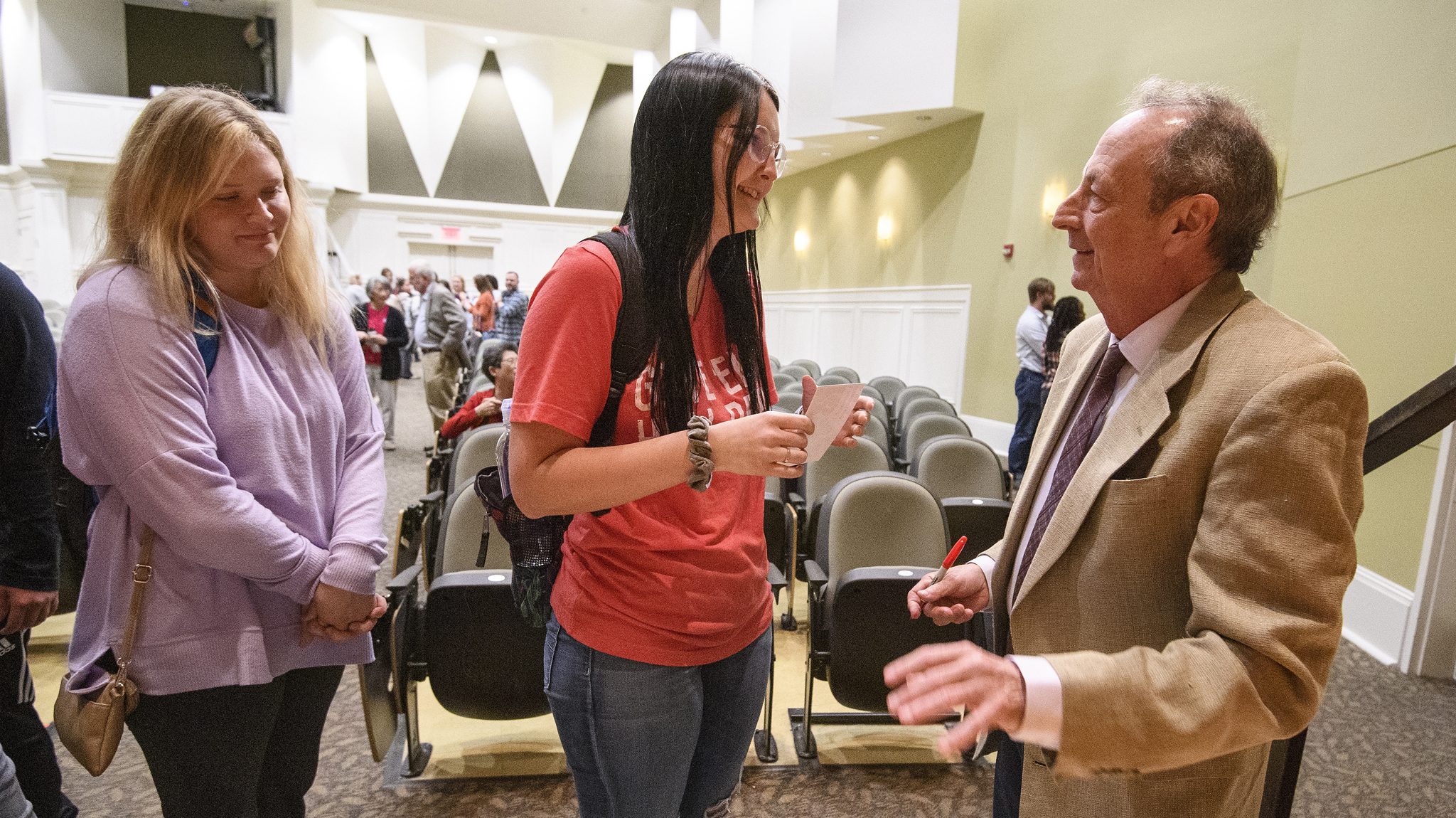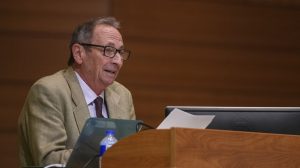
Ole Miss students chat with Alexander Bernstein following his lecture in Nutt Auditorium. Photo by Thomas Graning/Ole Miss Digital Imaging Services
OXFORD, Miss. – Alexander Bernstein’s connection to the legacy of his iconic father, Leonard Bernstein, probably began with a conversation they had in the family tree house when the younger Bernstein was 9 years old.
The son of the world-renowned composer, conductor, pianist, educator and activist visited the University of Mississippi on Tuesday (Nov. 6) as part of a global, two-year series of events celebrating what would have been the patriarch’s centennial birthday.
During his time on the Ole Miss campus, Bernstein gave interviews and a lecture and attended a commemorative concert of his father’s music presented by guest conductor Dennis Shrock, several soloists, the Bernstein Festival Orchestra and the UM Chorus, directed by Donald Trott.
“I remember my father asked me what I wanted to be when I grew up, and I said, ‘a teacher,'” Bernstein said. “He’d already subtly let me and my sisters know he wanted one of us to pursue the same musical path he had.”
Bernstein and his siblings all grew up seeing and hearing their father make connections between the arts and other academic disciplines.
Leonard Bernstein’s practices – which later officially became known as ‘artful learning,’ an interdisciplinary educational model that uses fine arts to strengthen learning in all academic areas – in the family home were inconsistent with traditional educational models used in the preparatory schools the Bernstein children attended.
“I certainly feel my learning life at home was different from my learning at the private schools I attended,” Alexander Bernstein said. “As a result, I was a terrible student. Just coasting along, never particularly interested in any particular subject.”
Years passed before Leonard Bernstein’s passionate thirst for knowledge and desire to share it with others was fully embraced by his son.
“I’d tried and failed at becoming an actor,” Alexander Bernstein said. “While earning my master’s degree at Harvard, I had an opportunity to substitute teach in one of the local schools. Through that experience, I became passionate about teaching.
“The connections between the arts and other disciplines my father spoke of finally began to make sense to me.”
When Leonard Bernstein received a grant to establish his foundation, the son helped launch the first Artful Learning model in the Nashville school system in the late 1980s. Reception to the new educational approach was initially far from enthusiastic.
“They told me I should have been carrying on my father’s musical legacy instead and fighting for more funding for music education instructors,” Alexander Bernstein said. “Instead, there I was – trying to get all teachers to incorporate the arts into their subject areas.”
Over time, schools using the model began to spread across the country, changing the landscape of teaching and learning. With his son serving as president of Artful Learning, Leonard Bernstein’s vision to use music and the other visual and performing arts as a means of instilling a lifelong love of learning in students is being fulfilled.
“Artful Learning creates an environment where students, parents and the community start to realize from the ground up how important the arts are,” Alexander Bernstein said. “Rather than teachers and performers telling them these things are important, they see for themselves that they are important to life. They matter.”

Alexander Bernstein shares memories of his famous father, Leonard Bernstein, during a lecture commemorating what would have been the music legend’s 100th birthday. Photo by Thomas Graning/Ole Miss Digital Imaging Services
The model begins with all teachers looking at the subject content that they are required by the state to teach. Together, they choose a concept and a significant question. The teachers then choose a masterwork to model their learning journey.
“In each classroom, the students go through the Artful Learning model process,” Bernstein said. “It includes four parts: experience, inquire, create and reflect.”
The results are exciting, he said.
“Data demonstrates that in every school where Artful Learning is used, the scores are going up,” he said. “Artful Learning helps kids acquire the skills needed to be the curious, focused, problem-solving adults we’ll need to realize the beautiful world that Leonard Bernstein envisioned for us all.”
Trott, who met Alexander Bernstein in 1992, just two years after his famous father died, said the visit was the highlight of the university’s celebration of Leonard Bernstein’s 100th birthday.
“Alex’s presence elevated the entire performance and overall experience, and we were all captivated by his unique insight and perspective on the music his father had composed that we were about to perform,” Trott said. “I was so appreciative of him taking the time from what is an extremely busy schedule to be with us. He is a very gracious person.”
Bernstein said he firmly believes that Artful Learning schools produce better human beings.
“By making connections between the arts and real life with other students, teachers, parents and the community, such collaborations yield academic improvement and critical thinking, and growth in compassion, understanding and civility,” Bernstein said.
“My father always said, ‘The best way to know a thing is in the context of another discipline.’ I know that he would be gratified to see so many students and teachers bursting with creative energy in their classrooms.”
For more information about Artful Learning, visit https://leonardbernstein.com/artful-learning.